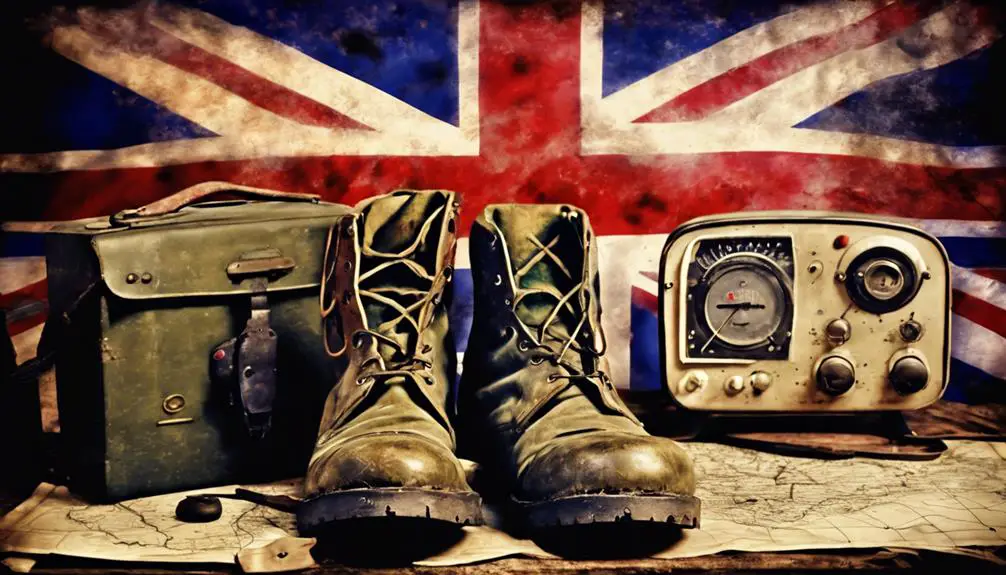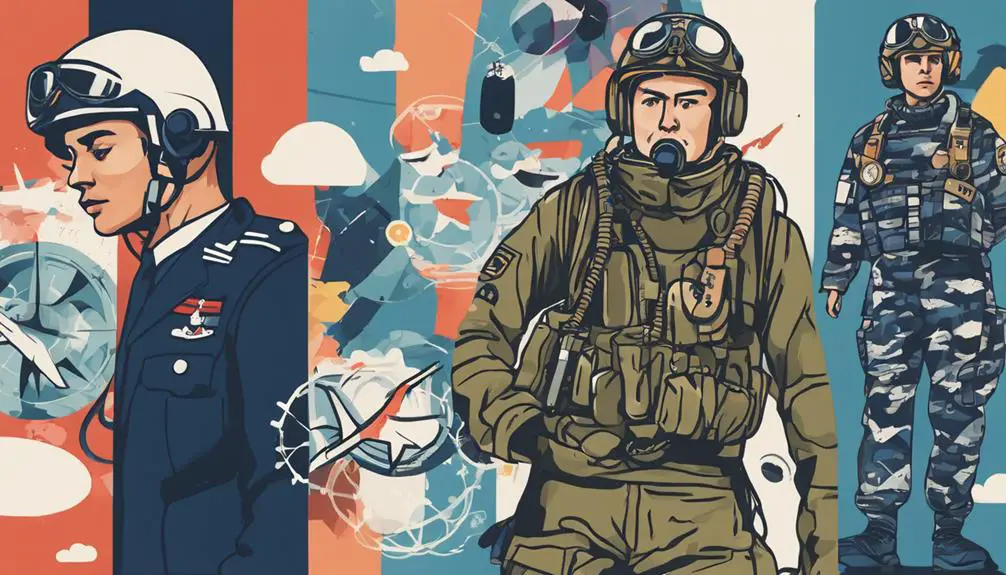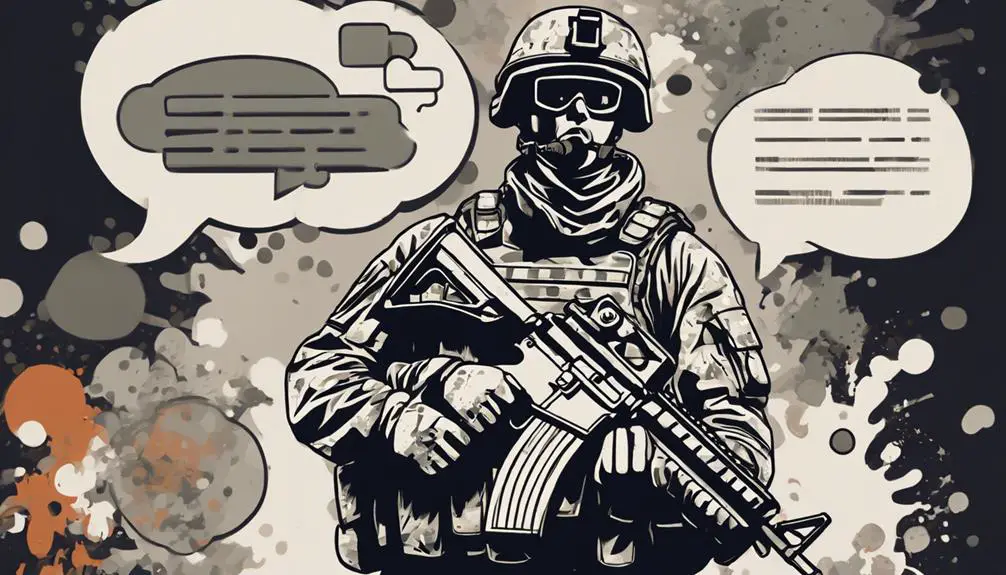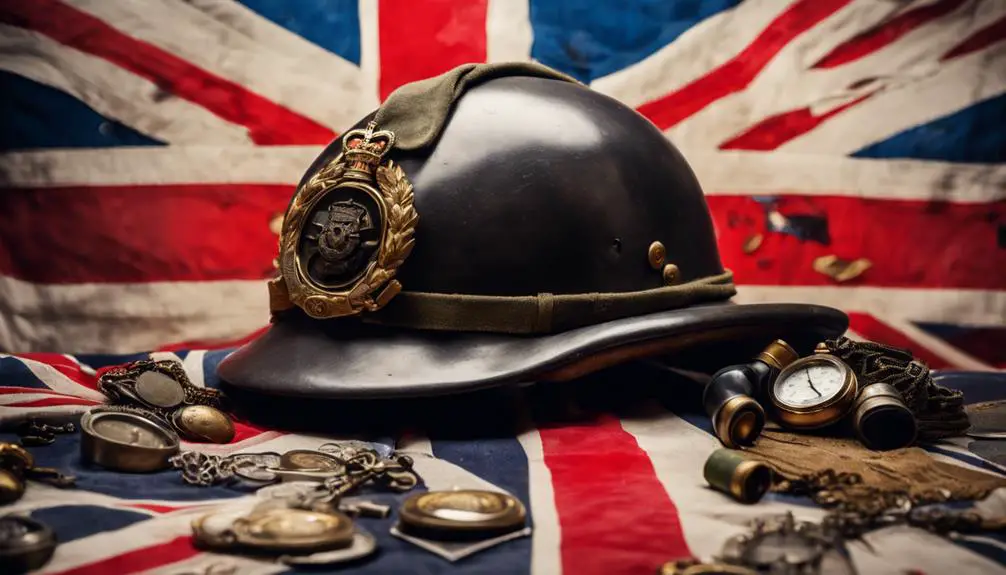You're interested in British military slang, a unique linguistic phenomenon shaped by cultural, social, and historical contexts. Common terms like 'squaddie' and 'brew' are part of the military's colloquial language. Each branch has its own distinct slang, reflecting unique cultures and histories. The Royal Navy uses terms like 'Gutted' and 'Dits', while the Army has lingo variations like 'Squaddie' and 'Rupert'. As you explore British military slang, you'll discover a window into the experiences and culture of personnel, and how it continues to adapt to modern warfare. There's more to uncover about this fascinating aspect of military culture.
Origins of Military Slang

What sparks the creation of military slang, and how do these colloquialisms evolve within the British military ranks? As you explore the history of military slang, you'll discover that it's often shaped by the cultural, social, and historical contexts in which soldiers find themselves.
The influence of history plays a significant role in shaping military slang, with events, people, and experiences leaving an indelible mark on the language used by servicemen and women.
The etymology of military slang is a fascinating area of study, with words and phrases often derived from a combination of cultural, geographical, and linguistic influences. You'll find that military slang emerges from the intersection of different languages, dialects, and cultural traditions, which are then adapted and modified to suit the unique needs and experiences of military personnel.
The development of military slang is an ongoing process, with new terms and phrases emerging in response to changing circumstances, technologies, and operational environments. As you investigate the world of British military slang, you'll uncover a rich tapestry of language, history, and culture that reflects the complexities and nuances of military life.
Common Terms and Phrases
In the British military, you'll frequently hear colloquial expressions like 'squaddie' for a soldier, 'gutted' for extremely disappointed, and 'brew' for a cup of tea. These phrases are just a few examples of the detailed language used by British military personnel.
As you navigate the world of military jargon, you'll find that understanding these colloquialisms is essential to communicating effectively.
A thorough Slang Dictionary can be a valuable resource in deciphering the nuances of military language. You'll discover that certain phrases, like 'crash out' (to go to bed) or 'chinned' (to be exhausted), are used across different branches and ranks. Meanwhile, others, like 'gobsmacked' (utterly shocked) or 'chuffed to bits' (extremely pleased), are more informal expressions used in casual conversations.
As you become more familiar with military jargon, you'll start to recognize the rich cultural heritage embedded in these colloquialisms. By embracing this language, you'll gain a deeper understanding of the British military's unique culture and camaraderie.
Slang in Different Branches

You'll find that each branch of the British military has its own distinct slang, reflecting the unique culture and history of that branch. This is because each branch has developed its own language over time, shaped by their specific roles, environments, and traditions.
Here's a snapshot of the different slang used in each branch:
| Branch | Slang Term | Meaning |
|---|---|---|
| Royal Navy | 'Gutted' | Extremely disappointed or upset |
| Army | 'Squaddie' | A junior soldier |
| Royal Air Force | 'Bogeys' | Enemy aircraft |
| Royal Marines | 'Bootneck' | A Royal Marine |
The Royal Navy, for instance, has its own jargon that's deeply rooted in its seafaring history. You'll hear terms like 'Gutted' to express disappointment or 'Dits' to refer to stories or rumors. Meanwhile, the Army has its own lingo variations, with terms like 'Squaddie' for a junior soldier or 'Rupert' for an officer. Each branch's slang is a reflection of their unique identity and camaraderie.
Evolution of Military Lingo
As military operations and technology have evolved, so too has the language used by British military personnel, with new slang terms emerging to describe modern warfare and its challenges. You'll notice that the lingo has adapted to reflect the changing nature of conflict, from trench warfare to counter-terrorism.
The institutionalization of military slang has played a significant role in shaping the language, with formal training and doctrine influencing the terminology used. This evolution has also had an impact on the historical significance of military slang, as it provides a unique window into the experiences and culture of British military personnel throughout history.
The language used by soldiers has been shaped by their experiences, from the trenches of World War I to the deserts of Afghanistan. By examining the evolution of military lingo, you'll gain insight into the adaptability and resilience of British military personnel, as well as the challenges they've faced on the battlefield.
Slang in Modern British Military

Today, you're likely to hear British military personnel using slang terms like 'Bergen' for backpack or 'Sangar' for a sentry post, reflecting the adaptations of modern warfare. As the military evolves to meet the challenges of the Digital Age, its language adapts too. Modern British military slang is a reflection of the cultural significance of their experiences, shaped by their operations and interactions in the modern battlefield.
Here are some examples of modern British military slang:
- 'Crab' refers to a Royal Marine
- 'Tom' is a colloquial term for a soldier
- 'Mucker' is a term of endearment for a fellow soldier
- 'Rupert' is a derogatory term for an officer
- 'Gucci' means something is good or excellent
These slang terms serve as a coping mechanism, providing a sense of familiarity and camaraderie among military personnel. They also highlight the importance of cultural understanding and shared experiences within the military community.
As the British military continues to evolve, its slang will likely continue to adapt, reflecting the changing nature of modern warfare and its cultural significance.
Frequently Asked Questions
Are British Military Slang Terms Used in Other English-Speaking Countries?
You might wonder if military slang terms from one country are adopted elsewhere. The answer is yes, cross-cultural adoption is common.
International influence plays a significant role in spreading military slang across borders. British military slang, in particular, has been adopted in other English-speaking countries.
You'll find terms like 'gutted' (extremely disappointed) or 'chin-wag' (casual conversation) being used in countries like Australia, Canada, and the US, demonstrating the global reach of military slang.
Can Civilians Use Military Slang in Everyday Conversations?
You're wondering if civilians can use military slang in everyday conversations. While it's not uncommon to hear phrases like 'break a leg' or 'bite the bullet,' using military slang can raise questions about cultural appropriation.
However, language evolution is all about borrowing and adapting terms. If you're mindful of social identity and use military slang in casual conversation, it can enrich your daily vocabulary.
Just be respectful of the origins and context, and use them thoughtfully in your casual conversations.
Are There Specific Slang Terms for Different Military Ranks?
When you're curious about military slang, you might wonder if there are specific terms for different ranks. The answer is yes, there are!
In many militaries, rank nicknames and officer aliases are used to refer to personnel. For instance, a lieutenant might be called a 'Lofty' or an 'Elf,' while a general might be nicknamed a 'Full Bird.'
These informal titles can vary across branches and countries, but they're an integral part of military culture.
Is Military Slang Only Used in Informal Settings?
You're wondering if military slang is reserved for casual hangouts, like a secret handshake among friends.
But, surprisingly, it's not limited to informal settings. Military slang often blurs the lines between formal exclusivity and casual boundaries.
You might hear a general use a colloquialism in a briefing, or a soldier throw in a slang term during a formal debrief.
It's not uncommon for military personnel to seamlessly switch between formal and informal language, making slang an integral part of their communication.
Are There Any Negative Connotations Associated With Military Slang?
You might wonder if using slang, in general, comes with a stigma attached.
Historically, slang has been associated with informal, even unprofessional, contexts. In the past, using slang could imply a lack of sophistication or education.
However, in modern times, this perception has shifted. Slang is now widely accepted as a natural part of language evolution.
In the military context, slang serves a specific purpose, and its use is generally viewed as a normal aspect of military culture, without negative connotations.
Conclusion
As you reflect on the world of British military slang, remember that language is like a camouflage uniform – it adapts to its environment, blending in to conceal its true meaning.
Just as a well-worn beret shields the face, military slang protects the identity of its users. Yet, like a badge of honor, it proudly displays the camaraderie and shared experiences of those who serve.
As you 'squaddie' your way through the ranks, remember that slang is more than just a dialect – it's a symbol of unity and strength.







